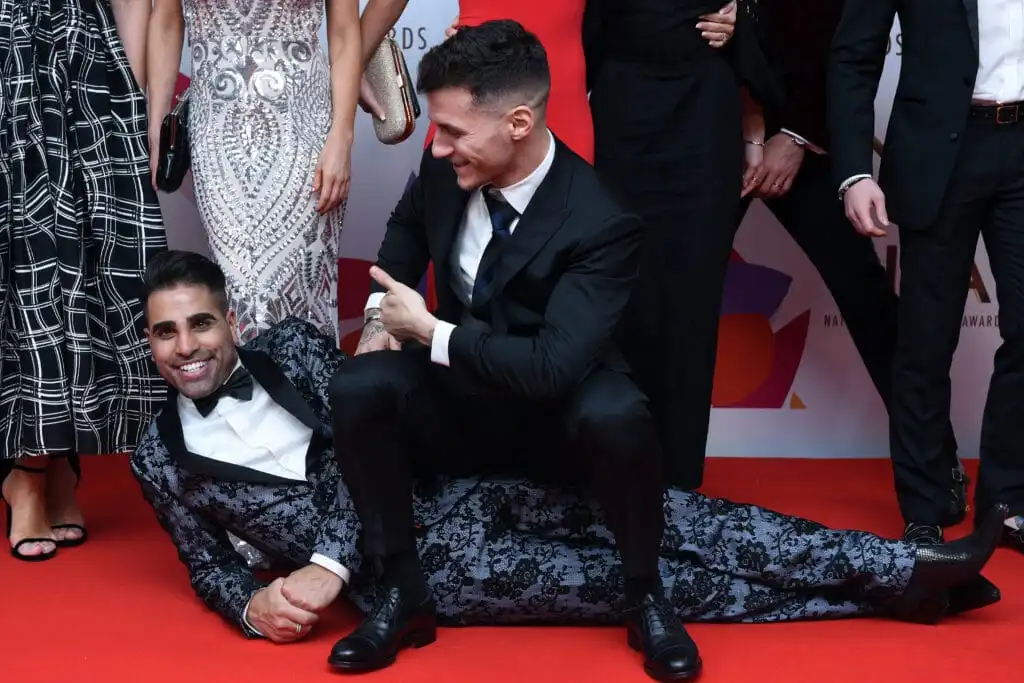Dr Ranj Singh shares advice on living with COVID and banning ‘abusive’ conversion therapy

Dr Ranj Singh at the Ideal Home Show 2022 in Olympia, London. (Supplied)
Most Brits know Dr Ranj Singh as the man with a million-watt smile and eternally chirpy personality often found sat on daytime TV show couches.
But in the children’s intensive care ward of a London hospital, patients know Singh as one of the countless exhausted but resolute healthcare workers.
While the banana bread days of the first lockdown are a distant memory, not much has changed on the frontline, Singh, 42, told PinkNews.
Chatting Strictly Come Dancing, conversion therapy and long COVID, the This Morning star isn’t taking off his face mask anytime soon – and to Singh, neither should Brits.
PinkNews: With coronavirus restrictions ripped away, Britons are gingerly returning outside – or rushing. As a healthcare worker and expert, how do you feel about Britain’s approach to ‘living with the virus’?
Ranj Singh: I and most healthcare workers agree that we have to still tread quite cautiously. While it’s important for us to get back to a ‘normal life’, we still have to be mindful that coronavirus hasn’t disappeared.
We are seeing patients with coronavirus being admitted to hospitals at an increasing rate, so it’s even more important that people get their boosters.
Long COVID as well is a real thing. A lot of people are suffering from it – myself included – and that’s something we need to be careful about. We still don’t know much about it.
We can’t let the virus run rampant because it will inevitably put people at risk of immediate and long-term problems.
What has your experience of long COVID been like?
I had COVID in July 2021. The initial illness of a couple of weeks wasn’t pleasant, but then I had physical symptoms for several months.
Breathlessness from just walking down the street. Feeling exhausted at the end of the day. I’ve had ongoing brain fog – memory problems, difficulty concentrating. I can’t handle too much because I get overwhelmed.

Ranj Singh. (Samir Hussein/WireImage)
I have to give myself brain breaks, slow down and say no to more things as I can’t do everything. It’s given me so much anxiety and I’ve been learning to manage that.
Queer immunocompromised people have told PinkNews they are similarly fearful about having to live with a virus that could be deadly to them. Do you have any advice for managing health anxiety?
Take each day at a time. One thing you don’t want to do when it comes to health anxiety is to avoid the situations that cause those feelings – that can make it worse.
Try to gradually expose yourself to those situations that cause you anxiety but learn to manage those feelings. Remind yourself that anxiety is a temporary feeling and you can and will feel better again.
Each day, push yourself that little bit more. Maybe one day, make it to the front door. After that, the garden, then the end of the street.
During the throes of the pandemic, you worked as a paediatric emergency medicine specialist. Are there any particular moments that stayed with you?
It was very, very real. I work with children and young people in intensive care and half of the department was converted for adults. While fewer children were less seriously affected, there was a significant number of adults that were quite badly impacted.
So we increased our capacity. We started looking for adult patients. That’s harrowing. That’s quite difficult to see that. Seeing the elderly and sometimes younger people on ventilators in intensive care in our children’s intensive care – that’s not something we’re going to forget.

Gorka Márquez and Ranj Singh pose in the winners room during the National Television Awards. (Joe Maher/WireImage)
The pandemic has had a really big impact on frontline staff. A lot of them worked at capacity for several years. They’re exhausted. We need to look after people on the frontline like they’re looking after us.
We had protests outside our hospital of COVID-deniers, some claiming the pandemic was a hoax. I can categorically say that’s not true. The reality couldn’t be more different – you just didn’t see it.
If there’s one thing medical experts agree on, it’s that conversion therapy doesn’t work. Could you share your thoughts on the debunked and dangerous practice and the British government’s approach to banning it?
As a healthcare professional and as a member of the LGBT+ community, there is no debate. I’m not just speaking as an individual here. Lots of internationally renowned healthcare bodies, organisations and professionals have said this.
It is an abusive and ineffective practice. It causes pain and suffering and, sadly, some have taken their life because of ‘failed’ conversion therapy.
If you cannot fundamentally change who you are, if we start debating conversion therapy we are coming at a position of saying that it might work.
We need to come out and say this is incorrect. I don’t understand why we need to debate something this harmful and has been outlawed in other countries. We need to have a quick, serious and decisive decision on this.
You took part in Strictly Come Dancing in 2018, paired with Janette Manara. Years later, the BBC show would see its first same-sex partners: Nicola Adams and Katya Jones in 2020 and then John Whaite and Johannes Radebe the following year.
In terms of the public’s response, both the good and the bad, were you surprised at all?
I wasn’t! I was glad. I felt like saying: ‘Told you so.’ I’m glad they gave it a chance. They saw exactly what all of us have been saying for a long time, that same-sex dancers have been part of dance for a very long time. This is nothing new.
It’s so powerful for people at home who may be struggling with their identity or who have never seen themselves on the screen. It was a wonderful thing.
Even though I had such an incredible partner and wouldn’t have changed it for the world – Jannette is one of our most outspoken allies and I’m so proud of her for that – if I could do Strictly again, I would dance with a guy regardless of their sexuality.
It would have to be someone short because I’m tiny. So I’d probably end up with Giovanni Pernice or Gorka Márquez.
You’re one of dozens of celebrities taking part in the Ideal Home Show, an exhibition featuring hundreds of interior design experts. What are you up to there?
It’s just such a great vibe here, everyone’s happy and the sun is shining. There’s a huge amount on offer here – there’s something for everybody, from mattresses to these amazing conker pod rooms.
My session is all about eating better, cheaper. A quick, healthier lunch recipe that is cheap. That’s the thing that surprises them – ‘oh, it looks expensive, well, it’s not! It was just £1.80.
You can find Dr Ranj Singh at the Ideal Home Show, in partnership with NatWest, the world’s longest-running home and interiors exhibition, at Olympia London until Sunday (27 March).
For more information and tickets, please visit idealhomeshow.co.uk.

